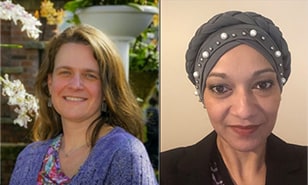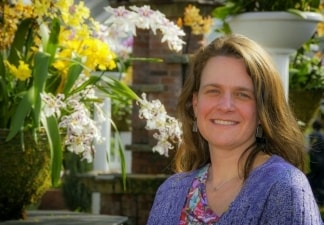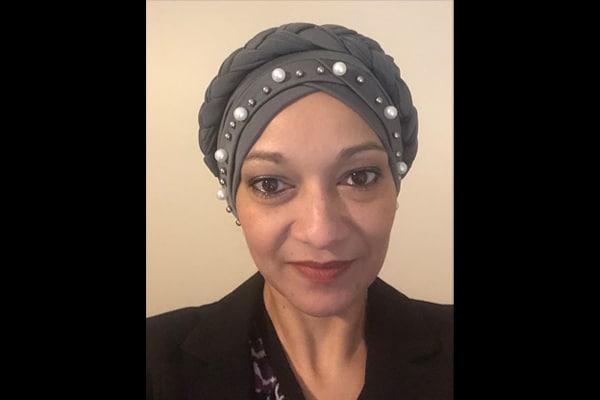What to know
Meet the Flu Fighters at the Allegheny County Health Department who are working to make flu vaccines more accessible in their community.

Background
Workers at the Health Department, led by Hannah E. Hardy and Evangel Sarwar, have been working in part through CDC's Racial and Ethnic Approaches to Community Health, or REACH program, to close the gap in health disparities among the different racial and ethnic groups in this Southwestern Pennsylvania county.
Hannah E. Hardy is currently the program manager for the Health Department's Chronic Disease and Injury Prevention program and oversees Live Well Allegheny, the countywide health and wellness initiative. Hardy has worked in multiple areas of local government and got her start in community development. Prior to working in the Health Department, Hardy worked for the City of Pittsburgh in the mayor's office. She also worked for many years in community non-profit organizations, including the Pennsylvania Environmental Council, a statewide environmental organization, and Let's Move Pittsburgh, which focused on childhood obesity.
Dr. Evangel Sarwar is the influenza coordinator at the Health Department. Sarwar has a Ph.D. in health care ethics and is a clinical ethicist. She also is an adjunct faculty member at California State University, San Bernardino, where she teaches public health at the graduate and undergraduate level.
Name: Hannah E. Hardy and Evangel Sarwar
Title: Hannah E. Hardy MPA: Manager of the Chronic Disease and Injury Prevention Program at the Allegheny County Health Department
Evangel Sarwar PhD, MPH: Influenza Coordinator at the Allegheny County Health Department
Location: Allegheny County, Pennsylvania
What is the goal of this program?
Our goal is to reduce the impact of respiratory illness and to increase flu vaccination coverage in areas where racial and ethnic groups are disproportionately affected by flu infections. This program is being used to facilitate discussions at the community level to better understand the barriers and some of the concerns about flu vaccination. The program also aims to increase the connections and communications between residents and health care providers, as well to mobilize our community ambassadors. These ambassadors are partnering with us to implement flu clinics and to spread information about the flu vaccine in their local community.

How does the program seek to address flu and health disparities?
One of the first things that we did was to pull together a countywide flu vaccine map. This increases the visibility of residents’ access to flu vaccination by showing flu vaccine locations. It also increases access to information about vaccine inventory and availability, including the times of operation for the different vaccine providers. We partnered with retail pharmacies, drugstores and health care providers that offer flu vaccines throughout the country. Any flu clinic event that is organized is posted on the flu map. That is one of our initiatives to increase the visibility of flu vaccines. We are also hosting free flu clinics with our community ambassadors. We held five clinics in November and five flu clinics in December.

We’re also engaging our faith-based community and partnering with an organization to help develop a faith-based flu toolkit. We are doing targeted communication using billboards, Port Authority advertisements, and other similar products specifically in our REACH communities. This grant is also giving us resources to do some message testing and focus groups, so that we can think longer term about how to really get to the core of reducing health disparities.
Why is it important to fight flu in your program’s communities?
One of the focuses this year, especially with COVID-19 pandemic, is to make sure that there is not a compounding of illness that stresses the health care system. We want to make sure that in addition to a pandemic we don’t have a twindemic. It is important in our REACH communities because we are aware of the racial and ethnic disparities and vaccination rates in minority communities. We want to make sure that we reduce that impact of respiratory illnesses in those communities.
What would you say have been some of the successes of your program so far?
We have seen successes in our African American communities where there are many challenges surrounding public health. There are information barriers and historical barriers that result in health disparities. There is a lot of mistrust and vaccine hesitancy. The flu vaccine has been around for years, but we were really surprised to find people during our flu clinics who have not received flu shots. We recently had a flu clinic where we had an individual in her 80s receive her first-ever flu vaccine, and that was because our nurse convinced her. Convincing people you know that flu vaccines can save lives and then also debunking some of the myths that are sources of misinformation are both the challenges and success stories of this program. Given the historical experimentations and social injustice that took place in these communities, this work is a success that we’ve been able to witness.
